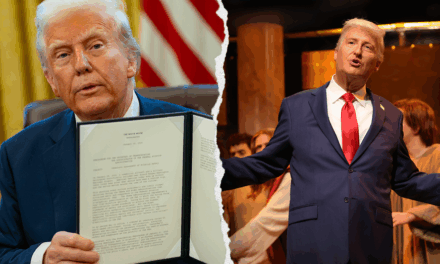In a shocking turn of events that has reverberated across the media landscape, CBS staff members have voiced their collective discontent regarding a settlement reached between Paramount, the parent company of CBS, and former President Donald Trump. This development has drawn harsh criticism from journalists and other employees at the network, who view the settlement as a stark violation of journalistic principles and ethics.
The controversy primarily stems from the financial dealings surrounding Trump’s lawsuit against CBS related to his portrayal in news segments. Many employees at CBS feel that the $80 million settlement reflects poorly not only on the network but also compromises CBS’s standing as a credible news institution.
Staffers have taken to informal discussions, memos, and even social media to express their outrage, labeling the agreement as “shameful” and a “betrayal” to the very essence of what journalism is supposed to represent. Reports indicate that this discontent has spurred significant pushback among staff members, fostering an increasingly toxic environment fueled by feelings of disenfranchisement and disillusionment.
The sense of betrayal is palpable among journalists at CBS, who have prided themselves on delivering unbiased and fact-driven news reporting through various outlets, including CBS News, CBS Sports, and CBS Entertainment. Many believe that the settlement trivializes their hard work and dedication, raising questions about the network’s editorial independence.
One CBS employee, speaking on the condition of anonymity, remarked, “This deal undermines thousands of hours of diligent reporting and countless sacrifices made by journalists. How can we claim to be impartial if our parent company is willing to pay off someone like Trump?”
Moreover, the issue has intensified discussions regarding corporate influence on journalism, particularly in a landscape dominated by large media conglomerates. Critics argue that such settlements not only serve to protect the interests of powerful individuals like Trump but also compromise the integrity of the journalists tasked with reporting the truth.
Many employees shared concerns that the settlement may lead to further erosion of public trust in the media as a whole. In an age where misinformation spreads like wildfire and opinions often overshadow facts, the decision by Paramount to reach this settlement signals to the public that corporate interests may take precedence over journalistic integrity.
In an attempt to address the unrest, CBS management has conducted meetings to explain the rationale behind the settlement. However, these meet-ups have done little to quell the growing animosity among staff. Employees argue that such explanations do not excuse or justify the failure to support journalists in their critical roles.
Public discourse has heightened around the settlement, provoking discussions on various social media platforms, where many prominent journalists and media analysts have weighed in on the unfolding situation. This online engagement has served to amplify the frustrations of CBS employees and has drawn attention to the broader implications of corporate influence in journalism.
Critics argue that the media’s credibility hinges on its ability to hold powerful figures accountable, and settlements like this threaten that accountability. Dr. Susan Rosen, a media ethics professor, stated, “Corporations must remember that their media teams are not just there to generate revenue; they have a responsibility to society at large. A setback like this settlement doesn’t just hurt CBS; it damages all journalists who strive for truth.”
Public figures, politicians, and advocates for press freedom have also weighed in, expressing solidarity with CBS journalists. Calls for greater accountability and transparency have surged, with organizations such as the Committee to Protect Journalists expressing their support for CBS employees who have bravely spoken out against the settlement.
The issue presents a crucial moment for the media industry as it grapples with the widening gap between corporate interests and journalistic integrity. With the rise of disinformation campaigns and public skepticism towards news organizations, CBS’s decision has drawn a considerable amount of scrutiny and may ultimately influence how media enterprises operate moving forward.
In summary, the outrage from CBS staff over Paramount’s settlement with Trump underscores the ongoing struggle between corporate media interests and genuine journalism. Employees have articulated a strong sentiment that their journalistic values are being compromised for monetary gain, reinforcing ongoing debates about the ethical responsibilities of media organizations in an age dominated by influence and power.
As the narrative surrounding CBS and its parent company continues to evolve, its implications extend beyond the confines of a single network. The fallout may serve as a bellwether for the industry, encouraging introspection and debates around how media companies prioritize their values in the face of increasing corporate pressures.
Ultimately, this episode has reignited discussions about integrity in journalism and the critical role that accountability plays in ensuring an informed and engaged populace. The need for transparency, independence, and ethical considerations has never been more vital, especially as media organizations navigate an increasingly complex and contentious landscape.
CBS’s response to employee concerns and the impact of this settlement on their long-term credibility will undoubtedly be watched closely not only by their staff but by the media industry and the general public alike. As CBS grapples with the fallout, the ongoing dialogue around the balance between corporate influence and journalistic integrity promises to remain a focal point in discussions about the future of journalism in America.
































